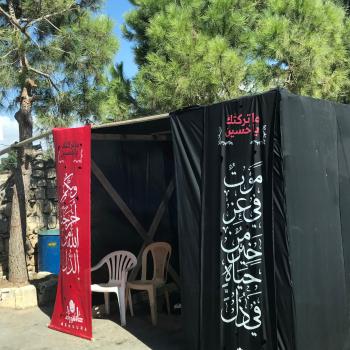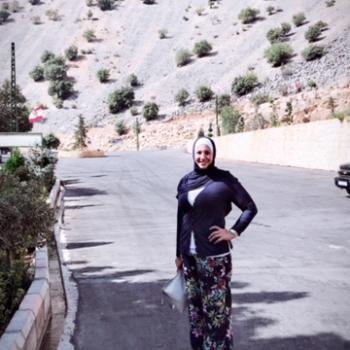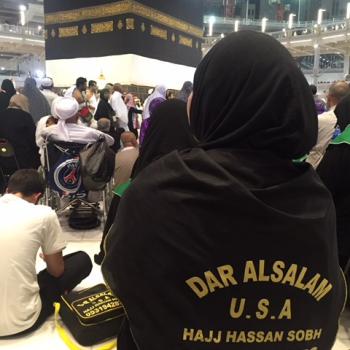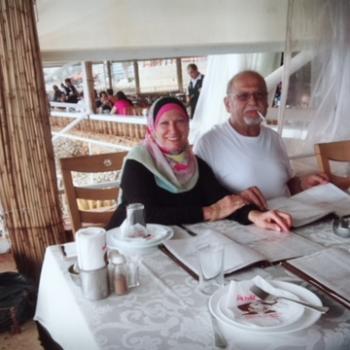I’ve experienced my first loss in Lebanon.
We have all lost someone or something we love. Loss is a part of life and death is difficult as it is, though, navigating cultural practices and traditions can make it even harder.
Arriving to the office last week, I settled in my chair, coffee in hand, checking emails. In walked a colleague, face drained of color, hands shaking, and says, “Did you hear what happened?”
Immediately, my stomach churned. Dreading the answer, I asked, “What are you talking about?”
Tears and worry in her eyes, she says, “Rima died this morning.” I lost all words and thoughts.
“Every soul shall have a taste of death: In the end to Us shall you be brought back.” (Holy Qur’an, Chapter 29, Verse 57)
Negligence
A dear friend, Rima, tragically died during a medical procedure. The doctor, accused of negligence while administering anesthesia, gave her a lethal dose that induced cardiac arrest.
Immediately, I called her daughter, also a close friend, and received the details of her passing. Through tears, she explained the doctor’s negligence and the multiple cardiac arrests that ensued.
I went straight to the house to be with the family. I could not imagine their pain and wanted to provide any comfort possible. I asked her permission to come over, given it had just happened hours before, and left the office.
Privacy preferred
Coming from a close knit community, mourning was never a private matter. Everyone knew everything, about everyone. Literally. Information was disseminated through social media, text messages, phone calls, and home visits over cups of coffee.
The “grapevine” is certainly long and strong in Dearborn, Michigan; though verification was always needed as stories were never told with full honesty.
The family wanted to be alone. As people flocked to the house, to pay respects upon hearing the news, the preference was that guests wait for the services at the mosque and community hall and leave the family to mourn, privately, in their home.
Far from Dearborn
There are certain aspects about life in Dearborn’s Arab and Muslim community that I don’t see here in Lebanon. It’s strange, as one would expect Lebanon to be more “old world,” when in reality, it is quite modern and western in aspects of social etiquette and protocol.
In Dearborn, death brought everyone out in support. Muslims are obligated in their social character to treat one another with kindness and good societal protocol. Especially in situations like death and mourning.
“O mankind! Lo! We have created you from a male and a female, and have made you nations and tribes that ye may know one another. Lo! The noblest of you, in the sight of Allah, is the best in conduct. Lo! Allah is Knower, Aware.” Holy Quran, Chapter 49, Verse 13
The community would turn out in mass to support families of the deceased, expressing condolences and bringing food and essentials. Beirut was a different experience for me. I felt lost trying to understand and navigate the mourning process.
Feeling awkward
For the first hours, I felt awkward, only knowing the children and one family member. I was momentarily grateful for being a social person as I was able to find my level of comfort and bring solace to those grieving, with ease. I truly believe that people can sense your honesty and compassion.
It was an emotional time for her son and daughter, and they did not want the house open to visitors on that first day. I cannot blame them as it was overwhelming with immediate family and close friends in such close quarters.
Beirut is a sea of tightly packed sections of apartment buildings. There are no expansive homes, gardens, backyards, or basements. Space is limited, especially for parking, and the capacity to deal with overflow is not easy.
It made me realize how many centers the community of Dearborn has that are readily available to accommodate such situations, especially with large families. It really is a blessing and eases the discomfort of being bombarded at home during such emotional moments.
Culture and faith
Lines are often blurred between faith and culture. Many times I have heard people say that this was haraam (forbidden) when in fact, it was culture, and not faith, dictating the perception of the matter in question.
There are very sensible boundaries between what fiqh (Islamic law) is and what is urf (custom). Too often, we become so comfortable in the way we view certain issues, that we do not take a moment to research the background or religious position.
Emotions left me overwhelmed and my heart ached for her children, a daughter and son, ages 25 and 28. I made dua (supplication) for the family and her departed soul throughout the day. It would bring my soul some ease and I prayed it would do the same for Rima and the family.
Sitting next to the family, I offered hugs and held hands during moments of pain and tears. One can never find the right words to say to a grieving family member. All I could do was hope that my prayers would bring some comfort.
“Oh you who believe! Seek assistance through patience and prayer, surely Allah is with the patient.” (Holy Qur’an, Chapter 2, Verse 45)
“Women are not allowed in here.”
The following day I arrived to the mosque in Beirut to attend the janaza (funeral) prayer. At first, two men would not permit me to enter, asking me to stand under a tree and wait, in the hot sun, so men could pass by and enter the prayer hall. One explained, eyes focused on the floor, “women are not allowed in the mosque during Friday prayer.”
When I asked why women were prevented from praying jama’aa (congregational) prayer on Friday, the holiest day of the week, I was told that they wanted to ensure enough space for men to pray. Offended, I asked, “Is it not important for women to offer jama’aa prayer?”
“O Maryam, be devoutly obedient to your Lord and prostrate and bow with those who bow in prayer.” (Holy Quran, Chapter 3, Verse 43)
The Prophet Muhammad (peace be upon him) said: “The prayer in congregation is superior to the prayer performed individually by twenty-seven degrees.” [Hadith, Al-Bukhari and Muslim]
Crickets. His eyes still fixated on the floor. “There is not enough room for both here. So we do not allow the women on Friday.”
Hmmmm. For real?!
Sensing my disturbed demeanor heighten, another gentleman interrupted the conversation. He asked me if I needed assistance. I explained that I was there for Rima’s funeral and he led me to the hall where her body was placed for viewing before al-dafin (burial).
Burial as soon as possible
In Islamic law, a Muslim should be buried within 24 hours, or as soon as possible, to avoid any sanitary issues.
There is a ritual for cleansing the body of the deceased and preparing it for burial. The deceased is wrapped in a clean and simple kafan (burial shroud). There is no embalming, beautification, or decorative jewelry or clothing placed on the deceased.
We return to our Creator in the same way we arrived to the earth, pure and clean.
“Indeed we belong to Allah, and indeed to Him we will return.” (Holy Quran, Chapter 2, verse 156)
Typically, there is a 3 day mourning period, though, time frames vary by cultures and sects.
“It’s haraam for women to attend the burial.”
I was surprised this came from a woman. Traditionally, men are present for the burial, though this does not apply to all communities, as many, including the Shia community in Dearborn, Michigan, allow women at the grave site.
I know this to be cultural tradition, yet this young woman expressed that, according to Islam, it was forbidden for women to go to the burial.
** That is false. It is not forbidden nor prohibited. Rather, it is disliked, culturally, in that women may not be emotionally prepared to handle it and would wail and make a scene. **
Hadith
A hadith (sayings of the Prophet, family and Companions – peace and blessings upon them) in Shia tradition states, “All extreme grief is disliked, except the extreme grief over the tragedy of Karbala.” Imam Hussain (peace and blessings upon him)
The Qur’an does not state that a woman cannot attend a burial. She is not prohibited, nor is it haraam (forbidden). It is expressed, through hadith that women should not wail and tear at their clothing during a funeral, especially over the body of the deceased.
Not allowing a woman at the burial is strictly cultural tradition and mainly attributed to the Arab world.
In the Sunni tradition, a hadith states: “Umm ‘Atiyah reported: ‘We were forbidden to accompany funeral processions, but this prohibition was not mandatory for us.’” (Hadith Related by Ahmad, Bukhari, Muslim and Ibn Majah)
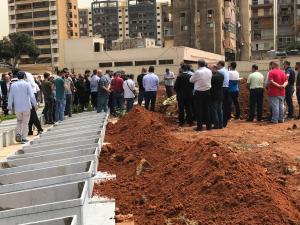
Still I went
Thinking her daughter was on her way to the burial, I followed the cars to the cemetery. I quickly noticed that I was the only woman there and lingered behind. I did not want to offend anyone. Waiting in the back, I watched the men in her family complete the burial rituals and place the casket into the earth.
I sincerely feel that witnessing a burial brings the heart some closure in seeing their loved one be laid to rest. At least, that’s how it makes me feel.
I sat and cried in silence. Absorbing this moment and the reality of our return to our Creator. It is inevitable and written for us. Death in Islam is an extension of life and the leaving of this world to the afterlife.
Inna lillah wa inna illayhi raji’oun “…Indeed we belong to Allah, and indeed to Him we will return.” (Holy Qur’an, Chapter 2, Verse 156)

Making supplication for her, I asked God to grant Rima the utmost mercy and pave her journey to Him with her prayers, patience through hardship, good deeds, and intentions.
“Indeed, I have rewarded them this Day (Day of Judgment) for their patient endurance – that they are the attainers of success.” (Holy Qur’an, Chapter 23, Verse 111)
Three days of mourning
Three days of mourning ensued. A local hall was filled with those paying their respects. From colleagues, politicians, significant members of Lebanese society, along with family and close friends, everyone came to extend condolences to her husband, children, and family.
As I sat in the hall, I couldn’t help but observe those around me. The services was eye opening for me. As I ached for the family, I could not help but take notice of people’s behaviors.
Dressed to perfection
Many were perfectly dressed and coiffed.
I felt under-dressed. I sat in my long black shirt, leggings, and flats alongside the family and could only think of her children and the pain they carried. My appearance did not matter that day or those that followed. I could barely gather my thoughts, let alone dress myself or apply makeup, tears threatening to spill over each time I hugged someone.
A sea of stilettos, heavy fragrances, pressed suits, full makeup, and perfectly styled hair entered services each day. This was unnerving, to me. Family and close friends in Lebanon told me this had become the norm at services in the city.
I’m sure this has happened in Dearborn, at times, though Beirut was more of an open society. Times have changed. I understand that with changes in society, people will change, too. They will adapt to new norms. Though , there are things I appreciate about the “old world” way of doing things.
During these few days, I ached for the simple traditions of my close knit community in Dearborn.
**This may not be the norm for all, but for those in my company, it was.**
Grace and dignity during sorrow
Only a handful of women sat, unapologetic, tears flowing. I felt their pain; raw and real. My heart filled with anguish as I watched Rima’s daughter, sitting in her own grief and heartache, get up from her seat and walk over to these individuals, embrace them and give solace.
The power of love and compassion that Rima carried within her was passed on to her daughter and son. During the services it was evident. They comforted grieving friends and one another with the utmost dignity and grace.
I am sure Rima was watching with pride.
Resting in peace
Though there were significant differences in regards to the funeral and services in Beirut from my native Dearborn, Michigan, one thing remained constant; the love and compassion shown by those who were impacted by her loss and the moments when her children forgot their own pain to console those who were grieving.
Rima raised two extraordinary young professionals. They embody their mother’s poise, grace, and love for others. She was a beautiful soul who gave of her love, effortlessly, welcoming those in her light with love and understanding.
An open home and heart
When I came to Beirut, she opened her heart and her home to me. She would check on me and harass me for being too busy to come by for dinner or coffee. I wish I had made more of an effort to spend more time with her. It is sad how we think of these lost moments when we lose someone we love.
She is at rest and I see her smile and the warmth of her eyes in her children. They are going to live her legacy and will carry their mother’s spirit with honor and poise.



